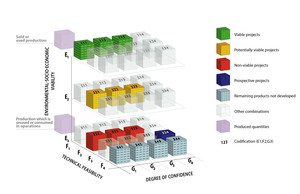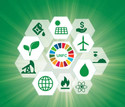 The United Nations Framework Classification for Resources (UNFC) provides countries, companies, financial institutions and other stakeholders a futuristic tool for sustainable development of energy and mineral resource endowments. UNFC applies to energy resources including oil and gas; renewable energy; nuclear energy; minerals; injection projects for the geological storage of CO2; groundwater; and the anthropogenic resources such as secondary resources recycled from residues and wastes.
The United Nations Framework Classification for Resources (UNFC) provides countries, companies, financial institutions and other stakeholders a futuristic tool for sustainable development of energy and mineral resource endowments. UNFC applies to energy resources including oil and gas; renewable energy; nuclear energy; minerals; injection projects for the geological storage of CO2; groundwater; and the anthropogenic resources such as secondary resources recycled from residues and wastes.
The emerging challenges in these sectors are the sustainable, environmental-friendly, carbon neutral and efficient development, production of energy and raw materials required for a growing population. Innovations in production, consumption and transportation are fundamentally challenging how energy and material sectors function today. As a unique tool for harmonizing policy framework, government oversight, industry business process and efficient capital allocation, UNFC is capable managing the natural resources required for the present and future needs of the society and realizing the objectives on Sustainable Development Goals (SDGs).
UNFC, in its core principles, encompasses the holistic management of all socio-economical, technological and uncertainty aspects of energy and mineral projects. The project maturity and resource progression model of UNFC can de-risk projects from costly failures and thus protect the investments. UNFC fully integrates social and environmental considerations and technology readiness required to bring clean and affordable energy resource projects into the market.
UNFC aims to provide clear and consistent specifications, guidelines and best practices for all energy and mineral sectors, which are of particular importance for the management of expanding demand of bioenergy, geothermal energy, solar energy, wind energy and hydropower resources.
To help the application of UNFC uniformly worldwide, guidelines on requirements for competency of the personnel are included in the system. UNFC provides case studies and implementation examples, not only to improve the consistencies in the usage but also to enhance the system through innovative applications.
Economic and Social Council (ECOSOC)
ECOSOC Decision 2021/250
Updated United Nations Framework Classification for Resources
At its 12th plenary meeting, on 21 July 2021, the Economic and Social Council, "noting that the Economic Commission for Europe, at its sixty-ninth session, held on 20 and 21 April 2021, had endorsed the updated United Nations Framework Classification for Resources of 2019, recommended that the updated Framework Classification be disseminated widely, invited States Members of the United Nations, international organizations and the regional commissions to consider the possibility of taking appropriate measures to ensure the application of the updated Framework Classification in countries worldwide, and proposed to the Council that it recommend the application of the updated Framework Classification worldwide, noting also that this proposal does not have financial implications, and recalling its decisions 1997/226 of 18 July 1997 and 2004/233 of 16 July 2004, invited States Members of the United Nations, international organizations and the regional commissions to consider the possibility of taking appropriate measures to ensure the application of the updated Framework Classification worldwide."
Committee on Sustainable Energy
The Committee on Sustainable Energy is an intergovernmental body that provides member States with a platform for international dialogue and cooperation. The Expert Group on Resource Classification is one of the subsidiary bodies of the Committee and has approved the current version of UNFC and its specifications.


